- Home
- Kathy Reichs
Two Nights Page 2
Two Nights Read online
Page 2
I looked around. More polished marble underfoot. More twisting crystal overhead. Through a partially open door to my right I could see a sliver of grand piano, above it the top half of an oil portrait, a man posing with one hand on his chest. Not a smiley guy.
I checked my image in a full-length mirror to my left. Jeans slim enough to fit my ass with legs long enough to reach my feet. With my height and lack of poundage, finding pants that fit takes serious searching. Not that I care much. White blouse roomy enough to hide the bulge at the small of my back. Hair doing unruly.
I was adjusting my ponytail clip when the maid returned and held the door wide with one fleshy arm. I followed her through to the outside.
A woman sat on a dark wicker sofa at the far end of the terrace, hair a wavery white beacon in shadows cast by flora hanging above her and potted palms flanking her sides. Despite the sticky weather, a patchwork quilt covered the woman’s lap and legs. A small dog, maybe a Pomeranian, slept curled on the quilt. The woman was stroking its back.
The maid crossed to the woman and said, “She here, ma’am.”
The woman showed no indication of having heard. The maid gestured me forward and spoke more loudly. “Mrs. Drucker?”
“There is no need to shout.” Without raising her eyes from the dog.
“Yes, ma’am. Ms. Night—”
“I heard you, Miranda. Lord in heaven, I think my dear dead mama heard you.” The vowels were broad, the voice cool as honey on ice.
“Yes, ma’am. Will y’all be needing something?”
“Have you asked our guest what refreshment she wishes?”
Miranda reoriented one shoulder toward me.
“Water, please,” I said.
Drucker flapped a blue-veined hand, as though swatting a fly. “Bring sweet tea.”
Miranda withdrew, eyes still on her shoes.
“Sit.” The hand indicated a chair, then resumed stroking the Pomeranian. Which, like the maid, didn’t grace me with a glance.
I sat. Seconds passed. A full minute. The dog was a snorer.
“Mrs. Drucker?”
Nothing but stroking and snoring.
“You contacted Beau Beaumonde about a problem you have.”
A tiny breeze toyed with the overhead baskets, tickling the petunia tendrils curling over their rims. I waited what seemed a very long time.
Silence.
“Mrs. Drucker?”
More silence.
I didn’t need this. I stood.
Drucker dragged her gaze from the dog to look up at me. I braced for the predictable. Some were shocked by the scar. Some repulsed. Most, uncomfortable, pretended it wasn’t there. A few stared, kids mostly.
Drucker’s face remained placid. It was what I expected, the flesh pooling below the orbits and sagging along the jawline, the wrinkles far too gentle to fit with the rings on her neck. A plastic surgeon had clearly been working the scene.
It was Drucker’s eyes that startled—red-rimmed near the ducts and lids, with irises so faintly tinted they appeared almost transparent. But it wasn’t the absence of color that chilled me. It was the absence of reaction. Or emotion. Or something I couldn’t identify then. Something I would later come to understand.
“I know who you are,” she said.
Finding the statement odd, I waited.
“Making contact does require diligence. No email. No phone. Really, sweetheart. It is the age of instant communication.”
“You managed.”
“I am a woman not easily deterred.”
“Congratulations.”
“Please sit.”
I did. Immediately regretted it.
“Sunday Night. Such an odd name.”
I felt a prick of annoyance. Not because the comment was untrue. Because I’d heard it so often. I said nothing. The dog slept.
The rheumy eyes looked me over. “I don’t understand your appearance. No makeup, black nails. Is that what’s meant by Goth?”
“OPI Black Onyx.” Knowing that wasn’t her question.
“You’re very tall, young lady. Bless your heart, in today’s world you are considered young. In my day, an unmarried woman of your age was called a spinster.”
“You wished to discuss a problem?”
“I know its origin. Your name, that is. It must have been difficult growing up in such circumstances. No forenames or surnames? Born on a Sunday so that’s what you’re called?” Drucker sniffed in disdain. “Truly inexplicable.”
The annoyance edged up. I drew the prescribed breath. Let it out slowly. Drucker rolled on.
“So very sad. I fear it is the children who suffer most.”
The gnarled hand continued caressing. The dog continued snoring. I continued saying nothing.
“How unbearable to have everyone you know die all in one swoop. To be left alone at a most delicate point in your life.”
“This is clearly a mistake.” I reached for my purse.
“Please, Miss Night. Spare me the drama. Given sufficient resources, anyone’s past is knowable.”
“Then use those resources to find someone else.” I started to rise. Which this time woke the dog. Drucker shushed it. The dog resettled, chin on its paws, sleepy eyes on me.
“Given your history, I believe you are most suitable for my purposes. But I’ve heard that you have a temper. That you are impetuous, impatient, and very poor at taking direction.”
“Is that so?” It was.
“My dear Miss Night. I’ve known Perry Beaumonde a very long time. Beau.” Drucker’s forehead creased. It was the first I’d noticed her eyebrows, which were scraggly white and now tight with disapproval. “I don’t like nicknames, but the world is what it is. Perry’s a fine man, was a fine officer. It’s not surprising he took you to raise.”
“For high school.”
“Which didn’t go well. Dropout. GED diploma. Arrest at age eighteen, record expunged. Administrative discharge from the military. Although, frankly, I’m not certain what that means. And, of course, there is the matter of not killing yourself on command.”
I stared, face a mask, heat prickling the back of my sternum. No way I’d do any favors for this bitch.
“How good are you at discretion?” Drucker asked.
“I’d give myself five stars out of five.” Terse.
“At survival?”
“Ten out of five.”
“If I hire you, will you see the job through to completion?”
“Hire me?”
“I wouldn’t ask anyone to work without pay.”
“I don’t think I want to work for you.”
“I’m offering one hundred forty thousand dollars plus expenses.”
“What is it you want done?” Not querying the large and somewhat odd figure.
“Twenty thousand dollars up front.”
“To do what?”
“The rest as the job is completed.”
“I find it tiresome to have to repeat my question.”
“Some people will do anything for that sum.”
“I’m not one of them.”
“You don’t care about money?”
“Not much.”
“Yes.” Drucker nodded once, as though mentally correcting herself. “I’ve heard that, too.”
Again, I fought the desire to get up and walk out. Wasn’t sure why I stayed.
“Should you not wish to sully your hands, the money can go to a charity of your choosing.” Thick with genteel sarcasm. “Anonymously, should your morals demand.”
Behind me a door opened, then footsteps crossed the terrace. Miranda placed two glasses on a low table between us, withdrew. Neither Drucker nor I went for the tea.
Instead she reached for an envelope to her right. Displeased with the jostling, the dog hopped from her lap, padded a few feet, and curled up on the far end of the sofa.
Drucker held the envelope out to me. I leaned forward and took it. She circled one gnarled finger, indicating that I should e
xamine the contents.
Inside was a single photograph. Good-looking woman, maybe mid-forties, two kids, one of each gender. The boy was all sunshine blond, smiling, unashamed of a mouth full of metal. His turquoise eyes gazed confidently into the lens. The girl had copper hair and freckled skin, and carried more weight than she probably liked. Her chin was up, her arms crossed defiantly on her chest.
The boy wore a pink designer polo and tan chinos. Mother and daughter wore pink linen sundresses and gardenia blossoms behind their left ears. The three were standing on a boardwalk, a beach at their backs.
I looked at Drucker, brows lifted in question.
“My daughter, Mary Gray Bright, and her children, Stella and Bowen. The picture is several years old.” Again the scornful sniff. “Taken long after her loser husband was finally gone. Alex. No loss.”
“You must be very proud of your family.”
“I was. Until a pack of vermin wiped them off the map.” Like the window-glass eyes, Drucker’s voice was devoid of emotion.
“Excuse me?” Shocked reflex.
“Mary Gray and Bowen were slaughtered in cold blood. God knows what they did with poor Stella.”
“I am sorry for your loss.” Lame. But all I could manage.
“I was able to hold a funeral at First Baptist. Closed casket, of course. Mary Gray had only half of her face. Bowen had no head at all. I bought them new outfits. Waste of money. No one could see.”
“When did this happen?”
“One year ago last week. No arrests were ever made.”
“The task you want done has to do with their deaths?”
“I want those responsible found.”
“I’m not a PI.”
“You were a cop. In the military you did investigative work.” Drucker handed me a second envelope. “You saw my grandson.” Another finger. “Now look at him.”
I lifted the flap. The envelope held six three-by-five color prints. I slid them out, winged the stack like a deck of cards. Included in each photo was an identifier. Slightly different from the format I knew, but familiar. I skimmed the data. The photos were part of a series taken by a Chicago PD crime scene unit.
Knowing the images would be grim, I braced myself. Tipped my head to accommodate my good eye. Looked at the first shot.
Grim. But dear God.
I drew a breath to fight slippage from the vault in my brain. Not quick enough. A montage detonated, headlight bright, cruel. A white disk moon. Blackened bodies arranged like radiating spokes. Talons of red on clapboard siding.
I swallowed against the curdling in my belly. Clamped my teeth. Continued my walk through the photos.
The images captured the remains of the horror that had taken Drucker’s family. A headless torso, the child shoulders a starburst of shredded flesh. A severed foot, sneaker still laced tight. A small, pale hand beside a boulder spray-painted with names. A woman faceup on grass, one eye wide and fixed, the other a raw crater, foamy red spittle flowing upward from what had once been her mouth. Tissue blasted onto a stone façade, dark and white and shiny and red.
I stared at the carnage. At the graffiti-covered rock. Something was wrong. What?
I glanced at Drucker. She was watching me, eyes silent crystals of ice.
“What did you mean about Stella?”
“She vanished in the melee.”
“You think she’s being held by those who did this?” A little memory bell was pinging. A bombing. A missing kid. Out on the island, I don’t follow news. But I’d caught snippets during supply trips to town.
“I do.”
“Her body wasn’t recovered at the scene?” Nervous, a dumb question.
“Would I be asking you to search for Stella if I had her remains?”
“Tell me about her,” I said.
“Ah, dear Stella. Always the sarcasm, the wisecrack, the witty retort.”
“A happy kid?”
“Far from it. Resentful, rebellious. I believe my granddaughter was deeply troubled. That there was a darkness inside her she worked hard to keep hidden. I’m not putting this well. Do you gather my meaning?”
Drucker’s description had cut right to my soul. I nodded.
“You’ve heard the saying ‘sad clown’? Well, that was my Stella.”
Sad clown. Mad clown. Bluster and sarcasm to hide the fear.
The bright ginger hair.
The pull to this kid felt visceral.
Placing the images facedown, I pushed myself up from the table and crossed the terrace. Back to Drucker, I spread my fingers and leaned into the house. The brick felt warm on my palms. It was red-brown and chipped, the mortar mushroom and flecked with black.
My vision blurred. I blinked it clear and returned to my chair.
“Do you know the names of the people who did this?”
“I do not.”
“Do you know why your family was targeted?”
“I’m not certain they were. Others died in the incident. My poor lambs may have been collateral damage. Such an inadequate term for human death, don’t you agree?”
“Please explain.”
“These butchers had their agenda. They cared not a toot for the people I loved.”
“Surely there was an investigation.”
She nodded, tight. “The police thought the bombers were terrorists targeting Jews.”
“Are you Jewish?” First Baptist?
“Good lord, no. The attack happened at some sort of Hebrew school.”
“What else do you know?”
“I know there were four of them, three men and a woman. Surveillance footage survived. The faces are unclear, but enhancements were done.”
Drucker handed me a third envelope, this one brown and larger than the ones lying on the table between us. In it was another series of prints, each a blowup of a frame taken at some distance from the subject. I flipped through them.
The images were grainy, the features barely recognizable. The four were in a vehicle, the woman riding shotgun. She was caught turning to her left, hair winging, mouth a dark circle in her face. One arm was outstretched. Reaching toward the driver? The others were looking straight ahead.
I returned the photos to their envelope, lifted the other two from the table, and started to hand all three back. Drucker stopped me with a raised palm.
“You keep them. They are not the originals.”
“You want me to find Stella. You think finding the bombers will lead me to her.”
Again the quick nod. “I’ll pay twenty-five thousand a head, an additional forty thousand to learn the fate of my granddaughter.”
“I’m to do what if I locate these people?”
“Such evil doesn’t deserve to suck air from the planet.”
“I won’t execute them.”
“You’ve never taken a life, Ms. Night?”
“Bunnies and kittens. But I eat what I kill.”
“Yes. I’ve heard you find yourself droll.” The folds under Drucker’s eyes twitched twice. “Your choice. Either way you get paid.”
“After so much time, there may be insufficient evidence to prosecute.”
“I know that. I want them caught. I would do this myself, but I am too old.”
“Your granddaughter may be dead.”
“I know that, too.” The scraggly brows dipped low over the crystalline eyes. Drucker studied me from below them, perhaps undecided. Then, “Two days ago an attempt was made to access funds at the Bank of South Carolina, a small account I established to teach Stella responsible finance. Besides myself and my accountant, the only persons with knowledge of the money were Mary Gray and Stella.”
“A withdrawal was made?”
“Do I look like a fool? Following the bombing, all log-in information was changed.”
“But you left the account in place.”
“Frankly, I forgot all about it. Until notified of the recent activity.”
“Did you tell the police?”
“
The police did nothing but waste my time.”
“You think Stella tried to access the money?”
“I think it’s a possibility.”
“The bombing took place in Chicago?”
“Yes.”
“Is that where you’d like me to start?”
“Really, Miss Night. Would Shanghai seem more logical?”
I slid free the family photo and studied the faces. Stella looked awkward, angry. Myself at her age. A fellow member of the tiny human tribe with fiery hair.
Was she alive? Being held captive?
I picked out the crime scene photo that had troubled me. Studied it a very long time.
Drucker must have seen something in my eyes, read it her way.
“Do we have a deal, Miss Night?”
I’d considered PI work after leaving the force. Private security. Running skip traces and spying on cheating spouses held no appeal. Ditto babysitting millionaire tycoons and their cronies.
But Beau was right. I had the skills. I could find these bastards. If they had Stella, I could bring her home.
Did I want to do it? Mixed feelings.
I had no desire to leave my solitude and rejoin the world. Still, I could nail those responsible. Maybe free a kid who was living in hell.
Decision. I didn’t like Drucker. But I’d do it for her daughter and grandson. For Stella.
For the thrill of the hunt? Hell no.
The buzzing adrenaline told me otherwise.
“I’ll need expense money up front,” I said.
“Have you something with which to make notes?”
I took a pen and small tablet from my purse.
“Peter Crage.” Drucker provided a phone number and address. “Mr. Crage is my financial adviser. He will give you the twenty thousand plus whatever you require.”
“For now, just expenses.” Not wanting to be obligated.
“Go to him. Provide a figure. He will be expecting you.”
“Talk about your granddaughter.”
Heart pounding, I thumbed to a clean page.
“Ms. Night, such a pleasure.” The sapphire on Crage’s finger must have weighed five pounds. “Mrs. Drucker advised me you’d be stopping by. Might I offer you something? Iced tea, perhaps?”
“No, thank you.” I’d hit a Starbucks on the way. More caffeine and sugar and I’d be photo-bombing the Hubble.

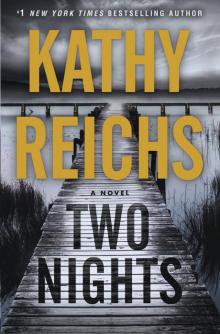 Two Nights
Two Nights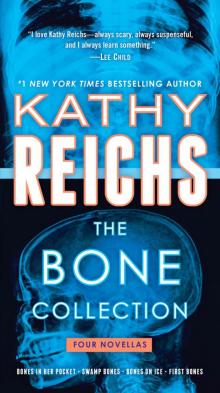 The Bone Collection: Four Novellas
The Bone Collection: Four Novellas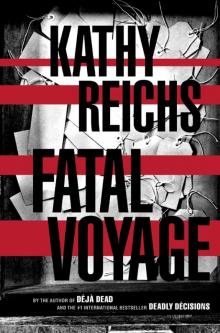 Fatal Voyage
Fatal Voyage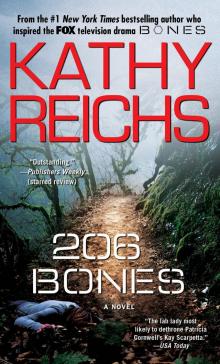 206 Bones
206 Bones Bones to Ashes
Bones to Ashes Terminal
Terminal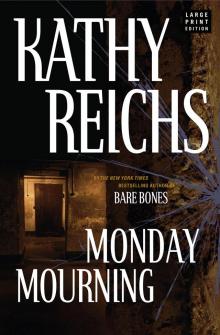 Monday Mourning
Monday Mourning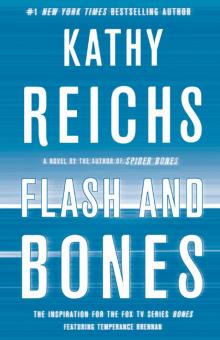 Flash and Bones
Flash and Bones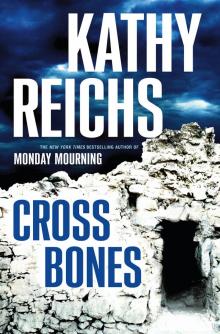 Cross Bones
Cross Bones Devil Bones
Devil Bones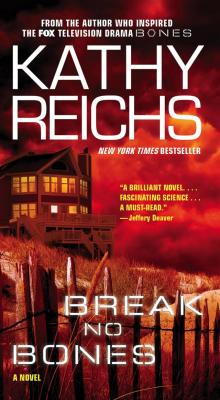 Break No Bones
Break No Bones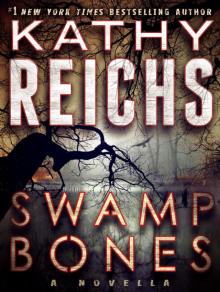 Swamp Bones
Swamp Bones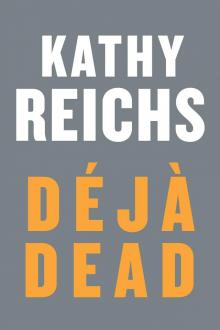 Déjà Dead
Déjà Dead Shock
Shock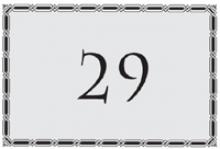 Spider Bones
Spider Bones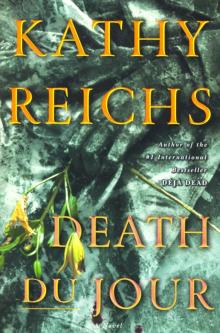 Death Du Jour
Death Du Jour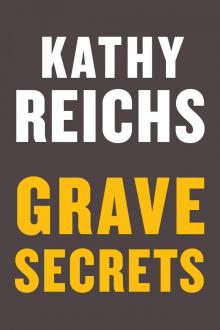 Grave Secrets
Grave Secrets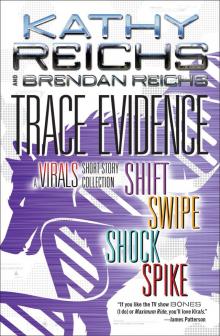 Trace Evidence: A Virals Short Story Collection
Trace Evidence: A Virals Short Story Collection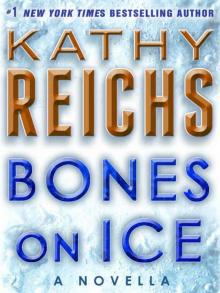 Bones on Ice
Bones on Ice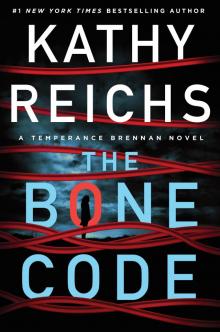 The Bone Code
The Bone Code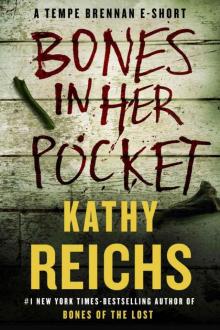 Bones in Her Pocket
Bones in Her Pocket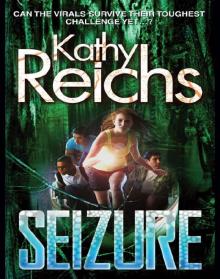 Seizure:
Seizure: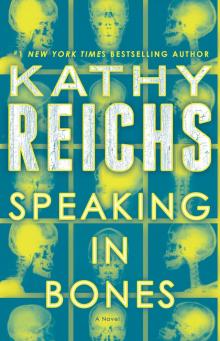 Speaking in Bones
Speaking in Bones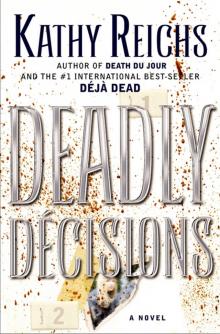 Deadly Decisions
Deadly Decisions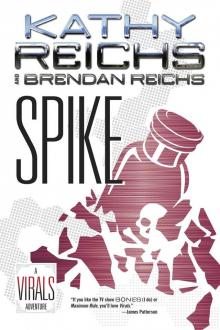 Spike
Spike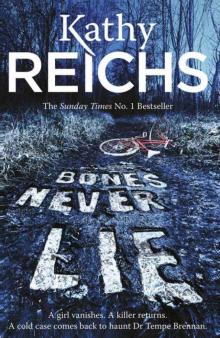 Bones Never Lie
Bones Never Lie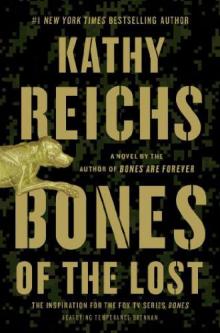 Bones of the Lost
Bones of the Lost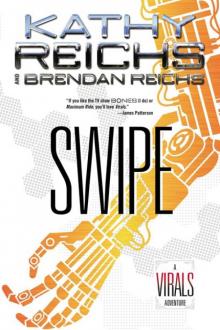 Virals 03.5 - Swipe
Virals 03.5 - Swipe Exposure
Exposure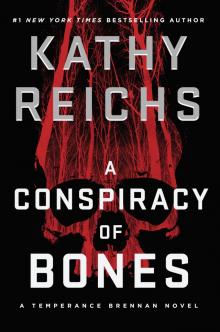 A Conspiracy of Bones
A Conspiracy of Bones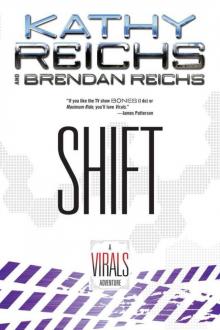 Shift (tory brennan)
Shift (tory brennan)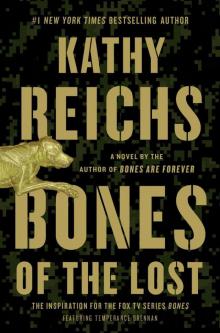 Bones of the Lost: A Temperance Brennan Novel tb-16
Bones of the Lost: A Temperance Brennan Novel tb-16 Virals tb-1
Virals tb-1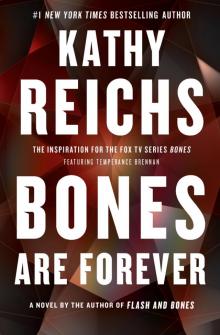 Bones Are Forever tb-15
Bones Are Forever tb-15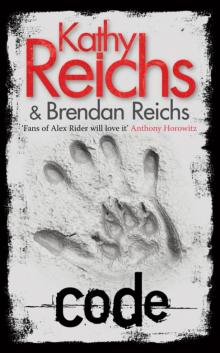 Code tb-3
Code tb-3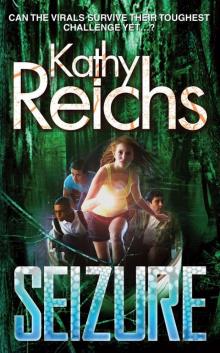 Seizure tb-2
Seizure tb-2 Deadly Descisions
Deadly Descisions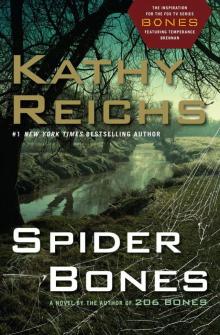 Spider Bones: A Novel
Spider Bones: A Novel